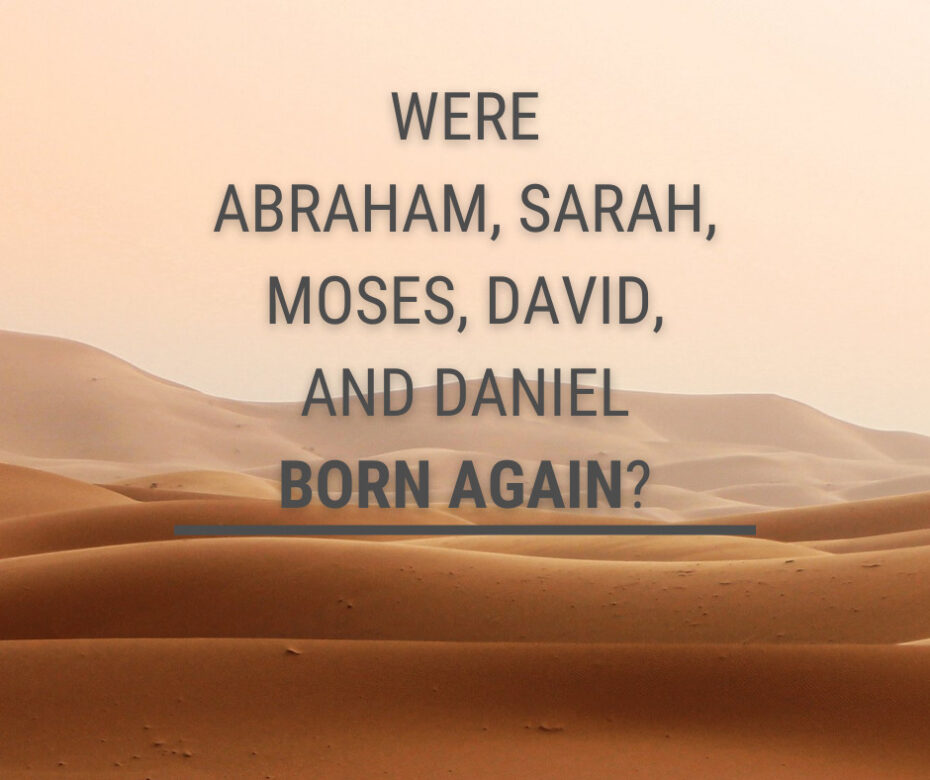I received this quality question in response to a blog I wrote:
A thought that came up in your article is whether the believers were born again (regenerated) before Jesus’ resurrection and the giving of the Holy Spirit at Pentecost. I have always held the view that believers before Pentecost were justified by faith but not regenerated by the Holy Spirit. Regeneration is the permanent indwelling of the Spirit giving us the new nature, i.e., being born again. I think (???).
I’m so glad for this question. I hear it a lot. And it deserves a careful answer.
First, the position stated by the reader is widely held by both OT and NT Evangelical scholars. That does not make it right. But it means that it is widely held and that there must be some evidence in its favor.
Second, the evidence in its favor is significant if we look only at the OT, but weak if we include the evidence from the Gospel of John.
The expression everlasting life or eternal life is only found once in the entire OT. Daniel 12:2 says, “And many of those who sleep in the dust of the earth shall awake, some to everlasting life, some to shame and everlasting contempt.” It is somewhat telling that the expression is only found once. In addition, everlasting life sounds like a future experience, not a present possession. (For a response, see this 2004 article by me entitled, “Regeneration in the Old Testament?”)
What about related expressions like born again (John 3:3, 7; 1 Pet 1:23) or begotten again (1 Pet 1:3). Are these expressions in the OT? No. Neither expression is found there.
So far, this sounds like a case against regeneration in the OT.
Third, however, there are many expressions in the OT that imply that OT believers were born again. Consider these verses from 1 Samuel:
“Then the Spirit of the LORD will come upon you, and you will prophesy with them and be turned into another man. And let it be, when these signs come to you, that you do as the occasion demands; for God is with you” (1 Sam 10:6–7, emphasis added).
“But now your kingdom shall not continue. The LORD has sought for Himself a man after His own heart, and the LORD has commanded him to be commander over His people, because you have not kept what the LORD commanded you” (1 Sam 13:14, emphasis added).
Only a born-again man would be “another man” and “a man after His own heart.”
Fourth, if OT believers were justified but not born again, then that means that spiritually dead people were righteous in God’s sight. To lack everlasting life is to be spiritually dead. How could a sinner who was spiritually dead be justified in God’s sight? And how could spiritually dead people write Scripture? How could they please God, as David clearly did (see above). And Abraham could not have been a friend of God, apart from the new birth.
Fifth, the Church does not begin until Acts 2. That means that the events recorded in John’s Gospel refer to pre-Pentecost times.
When Jesus spoke to Nicodemus about the new birth, He asked, “Are you the teacher of Israel, and do not know these things?” (John 3:10). He also said to Nicodemus, “You must be born again” (John 3:7). He was not speaking of something that could occur more than three years later. He specifically said, “whoever believes in Him…has everlasting life” (John 3:16). See also John 5:24; 6:35, 47; 11:25-27. The Lord did not promise that people would get everlasting life several years in the future. He promised it at the very moment of faith. And this was before Pentecost.
If people were born again during the ministry of Jesus, and they were, then the new birth occurred during the OT times.
Permanent indwelling of the Holy Spirit did not begin until Pentecost. Neither did the baptism of the Holy Spirit. But both regeneration and sealing did occur before the birth of the Church. Old Testament believers were both born again and sealed (= secure).
So, when did the new birth begin? It began with our first parents, Adam and Eve, before they were expelled from the Garden of Eden (see Gen 3:15). All OT believers were born again.


